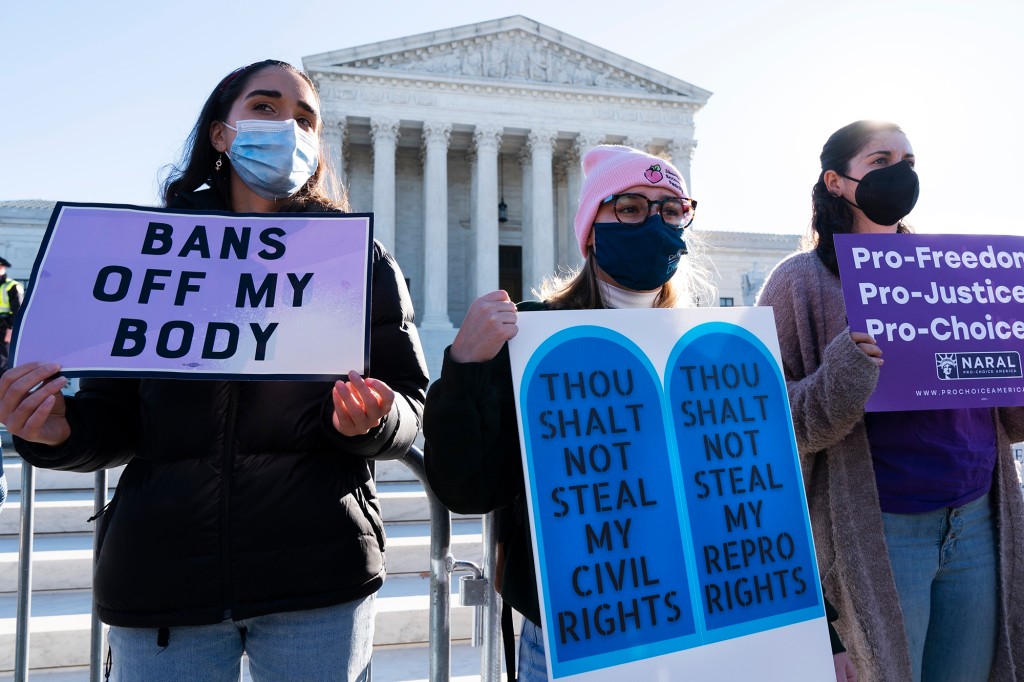WASHINGTON — Both sides are telling the Supreme Court there’s no middle ground in Wednesday’s showdown over abortion. The justices can either reaffirm the constitutional right to an abortion or wipe it away altogether.
Roe v. Wade, the landmark 1973 ruling that declared a nationwide right to abortion, is facing its most serious challenge in 30 years in front of a court with a 6-3 conservative majority that has been remade by three appointees of President Donald Trump.
“There are no half measures here,” said Sherif Girgis, a Notre Dame law professor who once served as a law clerk for Justice Samuel Alito.
A ruling that overturned Roe and the 1992 case of Planned Parenthood v. Casey would lead to outright bans or severe restrictions on abortion in 26 states, according to the Guttmacher Institute, a research organization that supports abortion rights.
The case being argued Wednesday comes from Mississippi, where a 2018 law would ban abortions after 15 weeks of pregnancy, well before viability. The Supreme Court has never allowed states to ban abortion before the point at roughly 24 weeks when a fetus can survive outside the womb.
The justices are separately weighing disputes over Texas’ much earlier abortion ban, at roughly six weeks, though those cases turn on the unique structure of the law and how it can be challenged in court, not the abortion right. Still, abortion rights advocates were troubled by the court’s 5-4 vote in September to allow the Texas law, which relies on citizen lawsuits to enforce it, to take effect in the first place.

“This is the most worried I’ve ever been,” said Shannon Brewer, who runs the only abortion clinic in Mississippi, the Jackson Women’s Health Organization.
The clinic offers abortions up to 16 weeks of pregnancy and about 10% of abortions it performs take place after the 15th week, Brewer said.
She also noted that since the Texas law took effect, the clinic has seen a substantial increase in patients, operating five days or six days a week instead of two or three.
Lower courts blocked the Mississippi law, as they have other abortion bans that employ traditional enforcement methods by state and local officials.

The Supreme Court had never before even agreed to hear a case over a pre-viability abortion ban. But after Justice Ruth Bader Ginsburg’s death last year and her replacement by Justice Amy Coney Barrett, the third of Trump’s appointees, the court said it would take up the case.
Trump had pledged to appoint “pro-life justices” and predicted they would lead the way in overturning the abortion rulings. Only one justice, Clarence Thomas, has publicly called for Roe to be overruled.
The court could uphold the Mississippi law without explicitly overruling Roe and Casey, an outcome that would satisfy neither side.

Abortion-rights advocates say that result would amount to the same thing as an outright ruling overturning the earlier cases because it would erase the rationale undergirding nearly a half-century of Supreme Court law.
“A decision upholding this ban is tantamount to overruling Roe. The ban prohibits abortion around two months before viability,” said Julie Rikelman, who will argue the case for the clinic.
On the other side, abortion opponents argue that the court essentially invented abortion law in Roe and Casey, and shouldn’t repeat that mistake in this case.
If the justices uphold Mississippi’s law, they’ll have to explain why, said Thomas Jipping, a Heritage Foundation legal fellow. They can either overrule the two big cases, Jipping said, “or they’re going to have to come up with another made-up rule.”
Conservative commentator Ed Whelan said such an outcome would be a “massive defeat” on par with the Casey decision in 1992, in which a court with eight justices appointed by Republican presidents unexpectedly reaffirmed Roe.
This court appears far more conservative than the one that decided Casey, and legal historian Mary Ziegler at Florida State University’s law school, said the court probably would “overrule Roe or set us on a path to doing so.”
Chief Justice John Roberts might find the more incremental approach appealing if he can persuade a majority of the court to go along. Since Roberts became chief justice in 2005, the court has moved in smaller steps on some issues, even when it appeared there was only a binary choice.
It took two cases for the court to rip out the heart of the federal Voting Rights Act that curbed potentially discriminatory voting laws in states with a history of discrimination.
In the area of organized labor, the court moved through a series of cases that chipped away at public sector unions’ power.

The high court also heard two rounds of arguments over restrictions on independent spending in the political arena before removing limits on how much money corporations and unions can pour into election advocacy.
If the court looks to public sentiment, it would find poll after poll that shows support for preserving Roe, though some surveys also find backing for greater restrictions on abortion.
Mississippi is one of 12 states ready to act almost immediately if Roe is overturned. Those states have enacted so-called abortion trigger laws that would take effect and ban all or nearly all abortions.
Women in those states wanting abortions could face drives of hundreds of miles to reach the nearest clinic or they might obtain abortion pills by mail. Medication abortions now account for 40% of abortions.
Some legal briefs in the case make clear that the end of Roe is not the ultimate goal of abortion opponents.
The court should recognize that “unborn children are persons” under the Constitution’s 14th Amendment, a conclusion that would compel an end to almost all legal abortions, Princeton professor Robert George and scholar John Finnis wrote. Finnis was Justice Neil Gorsuch’s adviser on his Oxford dissertation, an argument against assisted suicide.





